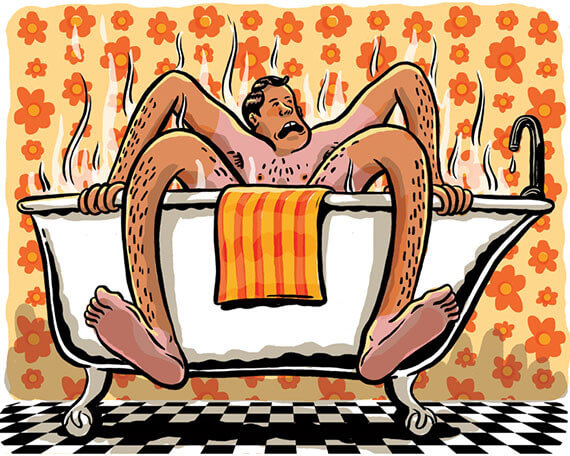One of my male friends once lamented to me that it should be those with penises who take birth control because he was always so scared his ladies might be too forgetful, or have nefarious ideas in their heads. I mean, trust issues, right? So what IS the word on male contraception?
But he had a good reason– a former girlfriend had gotten pregnant once after telling him she was on the pill because she thought he might leave her. He should’ve worn a condom.
He isn’t wrong for wanting some control. Even when used perfectly, no form of birth control is 100% perfect, so why not? And lucky for him, male contraception might be just around the corner.
It isn’t a new idea, either. For centuries, men have reduced their sperm count using neem, rue, and even hemp seeds. But the last decade or so, folks have started seeing contraception as a non-gendered responsibility. And that’s excellent. It leads to responsible, safer sex for both parties.
Just like with the next generation of condoms, scientists everywhere are scrambling to find the easiest, most effective form of contraceptive for men. Here are some big ideas that could be your new form of contraception:
Male Contraception — Pills

A hormonal contraceptive pill for the sperm-producer in your life could have the same side effects women on the pill experience: mood swings, weight gain, and loss of libido. Because of this, scientists are trying to find a non-hormonal pill and they’ve come up with some pretty cool, creative ideas.
One of those is called the Clean Sheets Pill. Modeled after an old blood pressure medicine recipe, the Clean Sheets Pill controls the muscles that make you ejaculate. Just because you don’t ejaculate doesn’t mean you won’t orgasm, though, and it doesn’t mean you’ll get blue-balled. Your body will just reabsorb the fluid without any problems, and you will still have felt the sensation of an orgasm, just with no sticky mess to clean up after. The Clean Sheets Pull could also be a boon to female partners, who won’t have to worry about a pH imbalance in their vaginas after intercourse or other issues, like UTIs. Researchers are even hoping that this pill might stem the spread of HIV.
Other non-hormonal pills have also been proposed. One blocks vitamin A receptors in the testicles, which makes them unable to produce sperm but doesn’t have an otherwise adverse effect. Testing will continue on both pills for the next few years, but it’s unlikely to be on the shelves any time soon.
Male Contraception — The Heat Method

The Heat Method has been around for centuries, although the nature of it makes most men less than willing to give it a go. Your balls have to be kept cooler than the rest of your body to work properly. I mean, that’s why they hang outside of your body– any temperature over 95 degrees will kill sperm cells. So why not heat things up a little?
The original Heat Method recommends men sit in a shallow bath of 116 degrees fahrenheit for 45 minutes daily for three weeks. Don’t pull out the aloe just yet though. Anything under 120 degrees is considered below the pain threshold and won’t be too uncomfortable, nor will they cause any damage to your skin or organs.
A more modern version involves wearing a special pair of underwear that keeps the balls close to your body, so they are constantly absorbing your own body heat.
However, after twelve years of testing, researchers came to the conclusion in 2012 that there’s a strong possibility that using the heat method long term can cause infertility or at least decrease the amount of sperm normally produced. Whether or not they will continue to pursue this method is unknown, but it’s not recommended that you undertake the Heat Method without a doctor’s supervision.
Male Contraception — Ultrasound
If you don’t want to take your girl to get an ultrasound in a few months, you may want to get one yourself. Using the same techniques that physical therapists use to treat injuries, ultrasounds can kill off sperm, making you effectively infertile for a few months at a time.
Contraceptive ultrasounds work by placing the testicles in a bowl of very warm water, then blasting very short, inaudible sound waves at them. Unlike the Heat Method, ultrasounds are completely painless and easy to use. Plus, you would only need one and bam! Completely baby-proof for three months.
Because they are so cheap and easy to do, ultrasounds have not been picked up as a method of male contraception, except to sterilize dogs in some countries. I know, right? The other issue is that there is no information on what such repeated exposure to ultrasounds could do in the long run– mainly because long term studies are just not being funded. But several private companies are currently looking to get funding from private investors, so this could be a viable method very soon.
Male Contraception — Vasectomies
Out of all of these methods, vasectomies are the only ones currently practiced routinely. They’re also quite popular. Plenty of men get them after they decide they no longer want children.
Vasectomies work by snipping the vas defrens, which are the tubes that move the sperm from the testicles to the ejaculatory ducts in preparation for orgasm. By cutting and sealing them, sperm cannot be ejaculated. It’s a very simple surgical procedure that many insurances cover.
So why wouldn’t you go out and get one right now? Well, like nearly every other type of birth control, they aren’t perfect. Slightly over 1 in 100 women get pregnant up to a year after their partners get their vasectomies. Another problem is that vasectomies are not always reversible. So they aren’t really a viable option for young men who want to just delay their baby-making a few years, or men who change their minds later on about having a child.
Male Contraception — Vasalgel

Vasalgel is an alternative to a vasectomy that is quickly becoming one of the most exciting possibilities in the world of male contraception. Instead of cutting the vas defrens, they are injected with a polymer that essentially blocks them so that semen cannot come through. If the man decides he wants children or would like to switch to an alternative method, another simple injectection will get rid of the polymer and he can be back to fertile status much quicker than with other forms of male contraceptives.
Clinical trials of Vasalgel are beginning next year, and researchers are hoping that it will be ready for market by 2015.
Male Contraception — Condoms

For now, apart from vasectomy, there aren’t many options for men to control their fertility, but there are a lot of promising projects coming down the pipeline. It’s also important to remember that none of these methods currently can prevent the spread of STDs, so, as always, when in doubt, wrap your spout.
